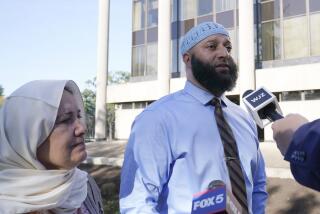Court Ruling Could Mean New Trials for Many Blacks
- Share via
WASHINGTON — In a ruling that could mean new trials for hundreds of blacks convicted by all-white juries, the Supreme Court said Tuesday that a 1986 decision barring prosecutors from excluding blacks from juries must be applied retroactively to all cases on trial or under appeal at the time.
Black convicts who were tried last year or whose cases were on appeal in a federal or state court may use Tuesday’s ruling to seek new trials. The ruling is not expected to have a major impact in California, where the state Supreme Court ruled several years ago that prosecutors may not take race into account in jury selection.
The U.S. Supreme Court declared last year that it would no longer tolerate the common practice of allowing prosecutors to remove blacks from juries that were to hear cases of black defendants. Convicts are entitled to new trials unless their prosecutors could show that they removed blacks from their juries for “neutral” reasons.
“Failure to apply a newly declared constitutional rule to criminal cases pending on direct review violates the basic norms of constitutional adjudiction,” said Justice Harry A. Blackmun for a 6-3 majority. “The new rule is to be applied retroactively to all cases, state or federal, pending on direct review or not yet final. There can be no exceptions.”
The convict whose case was decided Tuesday--Randall Lamont Griffith--faced the same prosecutor in Louisville, Ky., whose actions prompted last year’s decision reversing such convictions. The justices noted that the only difference between the case of James Batson, the key figure in the 1986 ruling, and Griffith’s was that the court had agreed to hear one before the other.
Attorneys representing black defendants said they had no idea how many cases could be affected by Tuesday’s ruling, but they estimated that the number would be in the hundreds.
“We presume there are quite a few, but we have no accurate way of knowing,” said Tanya Coke, research coordinator for the NAACP Legal Defense Fund in New York. “We do see a number of black defendants who are convicted by all-white juries and clearly they would have a right to appeal on that basis.”
In 1965, the high court ruled that prosecutors may not strike blacks from juries solely on account of their race but added that a defendant must show a “pattern” of such removals to prove racial bias. Last year’s decision put the burden back on prosecutors who used their challenges to remove blacks.
‘Disruption’ Seen
Justice Byron R. White, joined by Chief Justice William H. Rehnquist and Justice Sandra Day O’Connor, dissented from the ruling (Griffith vs. Kentucky, 85-5221), saying that it will have the effect of “causing substantial disruption in the administration of justice.”
In other actions, the high court decided:
--That a state may not use the 21st Amendment to require a fixed price for retail liquor sales.
In another in a series of rulings that narrow the scope of the amendment, which ended Prohibition, the high court said that a New York law setting a 12% markup by liquor retailers violated federal antitrust laws. “Such industrywide resale price fixing is virtually certain to reduce both interbrand and intrabrand competition,” said Justice Lewis F. Powell Jr. for a 7-2 majority. Rehnquist and O’Connor dissented in the case (324 Liquor Corp. vs. Duffy, 84-2022).
--That West Virgina must repay the federal government $10 million of disaster aid. After the Buffalo Creek flood in 1972, the Army Corps of Engineers, at the state’s request, rebuilt areas for mobile homes, but the state refused to pay for the work. An appeals court ordered the repayment, plus interest, and the high court unanimously affirmed that decision (West Virginia vs. U.S., 85-937).
More to Read
Sign up for Essential California
The most important California stories and recommendations in your inbox every morning.
You may occasionally receive promotional content from the Los Angeles Times.













